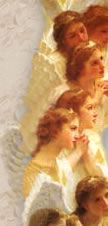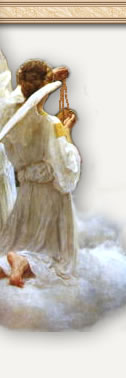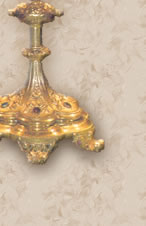




 |
|

|
|
|||||||||||
|
|
|
|
||||||||||||
 |
|
|
||||||||||||
 |
|
 |
|
|||||||||||
|
|
||||||||||||||
 |
 |
|
|
|
|
The Holy Office on Worship with
Non-Catholics from 1622 to 1939 Following such historical catalysts as the persistent Great Schism of 1054, the Protestant Revolt, and the Age of Exploration, there was begun by the Catholic Church a vast missionary activity throughout the world that had not been seen since the days of St. Patrick, St. Augustine of Canterbury and St. Boniface. Bishops and priests confronted an array of pastoral and moral situations for which they sought guidance from the Holy See. The Holy Office throughout this period preserved the original queries and the subsequent responses carefully crafted by its theologians and approved by the Roman Pontiffs. These collections became the standard references indicating the Church's sharpened self-understanding vis-à-vis her relationship with the non-Catholic parts of the globe. They shred the credibility of the oft-quoted mantra that "nothing has changed" in the modern Church. The Holy Office, also known as the Roman Inquisition (Romana Inquisitio), was a congregation in the Roman curia "dating from Innocent III (1194-1216), although some authorities attribute its establishment to Lucius III (1181-85). In the beginning of the thirteenth century Innocent III established at Rome an inquisitorial tribunal against the Albigensians and other innovators of the south of France. From its first title of Romana Inquisitio was derived the usage of calling this body the Congregation of the Holy Roman Universal Inquisition.... Later it had the official title Suprema Congregatio Sanctæ Romanæ et Universalis Inquisitionis. Pius X in his recent Constitution calls it, simply, Congregatio S. Officii."1 Under the pontificate of Paul VI, the name of the congregation was changed to the Congregation for the Doctrine of the Faith.2 The essential function of this office from its inception was to address and authoritatively judge matters pertaining to faith and morals. During the period of 1622 to 1939, questions regarding worship with non-Catholics were addressed to the Holy Office. The response of the Holy Office to the questions throughout the nearly three centuries which constitute this period is without exception consistent, giving one a grasp of the mens ecclesiae ("the mind of the Church"). This article will restrict itself to the Holy Office itself, not including statements from popes or other dicasteries on the issue during the period. The purpose of this article, therefore, is to provide an understanding of the Holy Office's teaching on worship with non-Catholics during a specific historical period which ended just twenty years before the summoning of the Second Vatican Council by Pope John XXIII. I. Participation in Heretical and Schismatic Worship in General In order to adequately address this topic, we must first consider the question of engaging in schismatic and heretical worship in general. We can then consider questions of participation in schismatic and heretical worship in particular. The discussion of participation in schismatic and heretical worship is rather detailed in the documents of the Holy Office from the period of the seventeenth century onwards. The Holy Office addresses schismatic and heretical worship by the term of communicatio in divinis, which later is changed into the phrase communicatio in sacris. The terms historically meant that those who worship together communicate in divine things, hence communicatio in divinis or in sacred things, whence communicatio in sacris. As for communicatio in divinis with schismatics and heretics, the Holy Office states that it is "constantly and uniformly forbidden."3 The Holy Office was principally dealing with questions sent by those working in mission territories where there may not be Catholic priests or where the non-Catholics tended to dominate demographically. Yet, the Holy Office declared that even if one cannot find a Catholic priest, one cannot participate in schismatic worship,4 even if it is a Catholic rite.5 Here the question, as far as the Holy Office was concerned, is not whether the worship is Catholic, but whether one can join with schismatics or not. Historically there have been occasions where Catholics find themselves in locations where there was no Catholic priest, but the schismatics who were present offered the same ritual as was offered by the Greek Catholics and now today by the Roman Catholics. The Holy Office went on to say that Greek Rite Catholics, when they do not have their own church, cannot go to the Greek rites said by heretics and schismatics, but they should go to the Latin rite.6 Therefore, if the rite to which a Catholic belongs is not offered in his area, he is to assist at a different rite said by a Catholic priest. If there is no Catholic Mass available [a Catholic rite said by a Catholic priest], one is not held to the precept of hearing Holy Mass. One cannot attend a non-Catholic Mass.7 In connection to this discussion, the Holy Office stated that Catholics were forbidden to approach schismatic churches, when there is no Catholic Mass, in order to hear Mass, even if there is nothing contrary to the Faith.8 When there is no Catholic priest available, they are not held to the precept of hearing Mass. In relation to Greek Catholics, the Holy Office was wont to observe that they should attend a Latin rite church, if available, and the same would apply to Latins. This would follow since Catholics must avoid all communicatio in sacris with schismatics and heretics.9 Catholics were forbidden to give alms at a Mass offered by a schismatic priest,10 presumably since this would be a form of support of false worship and confirming the schismatic priest in his error by financial support. Furthermore, one cannot participate in schismatic prayer, even if there is nothing contrary to the Faith.11 Again, the Holy Office said that it is not so much a matter of whether the prayer contains anything objectionable to the Faith, but the very fact that one participates with schismatics. For this reason the Holy Office said that by participating [in schismatic and heretical worship], Catholics give exterior signs of segregation [from] and disapproval12 [of the Catholic Church] by unifying themselves with those who disapprove or segregate themselves from the Catholic Church, since participation in liturgical actions constitutes a sign of unity.13 By coming together with them in unity of prayer, in unity of cult, in unity of veneration and worship, one does so with perverse14 schismatic and heretical ministers.15 In effect, the Holy Office was saying that it is by the very coming together with those who reject the Faith and joining one's prayer and worship to them that one is participating in worship which is done by those who reject the Catholic Church. To participate with those who reject the faith is therefore forbidden. With heretics, there are errors pertaining to matters of the Faith,16 and given the aforementioned considerations regarding schismatic worship, the Holy Office stated that participation in schismatic and heretical worship is forbidden for the following reasons. First, there is a danger of perversion of the Catholic Faith,17 i.e. there is a danger of the loss of Catholic Faith. This indicates the implicit obligation to protect one's faith. Second, there is the very danger of participating in a heretical or schismatic rite,18 for the above mentioned reasons, i.e. the very participation manifests a sign of disunity from the Church by being united in worship with those not united to the Church. Third, participation in heretical or schismatic worship is a danger and occasion of scandal.19 By scandal, we presume the Holy Office meant that participation in schismatic and heretical worship can affect the Faith of others who see Catholics involved in such worship. Fourth, in schismatic churches there is the commemoration of some schismatics who are venerated as holy; there are images, cult of relics or feasts that are celebrated of those who died in schism as well as the commemoration of living patriarchs or schismatic bishops and heretics.20 Fifth, by participating in their worship, one confirms schismatics and heretics in their errors.21 The Holy Office therefore observed that the Council of Carthage forbade praying and singing (psallendum) with heretics.22 The Supreme Congregation stated that participation in schismatic and heretic worship is "universally prohibited by natural and divine law...[from which] no one has the power to dispense ...[and with respect to this participation] nothing excuses."23 Those who so participate must seek absolution in the sacrament of penance.24 II. Participation in Heretical and Schismatic Worship in Particular Having forbidden participation in non-Catholic worship in general, the Holy Office likewise answered questions about the application of this prohibition in a variety of different circumstances. The first category of circumstances is Catholics participating or attending schismatic and heretical worship and/or churches. The second category of circumstances is with respect to non-Catholics joining in Catholic prayer, worship or the reception of sacraments from Catholic priests. As to the first category, the Holy Office addressed the question about whether Catholics can receive sacraments from non-Catholics. It said that Catholics may do so provided the following conditions are in place.25 The first is that there must be grave and urgent cause.26 Second, it must be administered by a validly ordained non-Catholic priest who administers the sacrament by a Catholic rite without any mixing of the condemned rite (ritus damnati).27 Third, by the communicatio in divinis, there must be no external professing (protestatio) of false dogma. Fourth, it must not cause scandal. While this pertains to the reception of sacraments for a grave and urgent cause, for those occasions which are outside of those conditions, it is forbidden. Hence, the Holy Office forbade Catholics to go to the funeral of non-Catholics, except from a causa civilis,28 i.e. from a civil cause. By this, it appears we are to understand that only those who hold a civil office or a position of prominence within a civic community could go to the funeral of a non-Catholic. However, those who attend a funeral for a civil cause may do so only if their presence is material,29 when there is no harm to the Catholics30 and when they do not participate in the rites or ceremonies.31 This means that Catholics at non-Catholic funerals cannot be pallbearers in a procession to or within the heretical church.32 However, they can accompany the body to the cemetery but must be separate from the non-Catholics.33 Catholics were forbidden to carry candles in the funeral procession of schismatics,34 presumably since this would be a form of communicatio in divinis. When schismatics have a procession of the Blessed Sacrament, Catholics are to adore the Blessed Sacrament as it passes, however, they cannot associate with the schismatics.35 This would seem to indicate that Catholics should kneel or perform some other form of reverence while not participating in the actual procession itself (i.e. walking in the procession), nor engaging in the singing in conjunction with the procession. A Catholic bishop is forbidden to go to a schismatic Greek church to chant the doxology.36 Catholic priests are entirely forbidden to offer Holy Mass in the private houses of and in places frequented by schismatics and heretics.37 Catholics were forbidden to be godparents at the Baptisms of schismatics and heretics.38 It is not licit to receive the nuptial blessing from a non-Catholic minister.39 We may surmise that this is due to the fact that it is a form of communicatio in divinis with the non-Catholic minister. As for Catholics going to the marriages of Catholics being married outside of the Church, the Holy Office says this is forbidden by virtue of law (regula). However, it may be tolerated for a causa civilis,40 and provided that, scandal being removed, there is no perversion of the Faith or contempt for ecclesiastical authority.41 This meant that unless one had a civil cause, one was forbidden to go to the wedding. When approaching or entering a schismatic or heretical church (building), the Holy Office had several conditions. First, one can enter out of curiosity as long as there is no communicatio in sacris with the schismatics or heretics.42 The Holy Office says that to go to a heretical temple as long as it is viewed as a profane edifice is an indifferent moral act,43 i.e. it is in itself neither morally good or morally bad, but is rendered bad based upon a depraved end (motive) and circumstances.44 It appears that the Holy Office said that the heretical church is to be viewed as a "profane edifice" precisely because it is not holy in the sense of having been made holy or sacred by a due rite of the Catholic Church. Entering a schismatic or heretical church is materially sinful if: (1) one has the intention of assisting at a sacred function of heretics, (2) one goes and it is seen or seems to appear to be a communicatio in divinis with heretics and thus an occasion of scandal, (3) such going proceeds from an indication given by a heretical governor (civil magistrate) as a protestation of the Faith or religion of Catholics, (4) one wills a token union of Catholics and non-Catholics, i.e. as a sign of unity of Catholics and non-Catholics.45 This also meant that Catholics could not go to a schismatic church and pray privately during the services of non-Catholics, even to avoid persecution.46 However, a Catholic may enter a schismatic church, pray before the images and the Blessed Sacrament, provided there is no scandal and no joining in the prayers with the schismatics.47 Catholics cannot contribute to the building of heretical churches.48 However, one could help to build the "sacred" building of heretics provided that (1) it is not viewed as a positive approbation of the false religion, (2) it does not have anything which directly and per se expresses something contrary to the Catholic cult and expresses approbation of the condemned (damnati) cults of heretics and (3) that those building the heretical church are warned not to cooperate in the heretical cult.49 Catholics were forbidden to play the organ in heretical churches.50 Catholics were forbidden to swear on and kiss an heretical bible.51 As for non-Catholics coming and participating in Catholic worship or receiving sacraments from Catholic priests, the Holy Office made several statements and observations. As to the reception of the sacraments by Greek schismatics, the Holy Office appears to restrict Catholic priests to administering only the sacrament of penance and only in the "case of extreme necessity."52 Presumably the operative principle is salus animarum suprema lex est (salvation of souls is the supreme law). In Catholic funerals, schismatic priests are not to be tolerated, except, perhaps, if they offer a purely material presence (passive presence, i.e. they do not participate in the worship) and a civil ministry.53 Non-Catholics are to be tolerated at Catholic worship provided they offer a mere material presence for the purpose of civil honor to the dead and they do not mix in with the prayers and rites of Catholics.54 Moreover, heretics cannot sing in our churches nor serve at the altar at Mass.55 Protestants can come to Catholic Baptisms but they cannot participate (communicatio in sacris)56 and non-Catholics can be tolerated at Catholic weddings provided they do not participate (communicatio in sacris) and there is no scandal.57 The Holy Office also stated that Catholic missionaries are forbidden under pain of suspensio a divinis ipso facto58 to invite schismatic government officials, offer them blessed water when they enter and to exhibit any kind of honor, when some feast is celebrated.59 On a different note, the Holy Office observes that if there is no Catholic to play the organ, if the scandal is remote, a non-Catholic could play the organ.60 The Supreme Congregation stated that, on the Epiphany, it may be tolerated that Catholic priests with fear of coercion from schismatics may bless their houses, but not in any way so as to seem to communicate with them in prayer.61 Lastly, Catholic priests may exorcize Turks (Moslems) but the Turks must be educated and persuaded about the authority of the Church to minister in this way, which was given by Christ, without the priests giving any false idea that it comes from human science or art.62 Conclusion To summarize, we may recall that the Holy Office said that it is not so much a matter of whether schismatic worship contains anything objectionable to the Faith; rather, the problem is the very participation in worship with schismatics. By participating in schismatic and heretical worship, one is giving exterior signs of segregation and disapproval. Any participation in liturgical actions would constitute a sign of unity with those who are not in union with the Church. By coming together with them in unity of prayer, in unity of cult, in unity of veneration and worship, Catholics would offer worship with perverse schismatic and heretical ministers. In effect, the Holy Office said that it is by the very coming together with them and joining one's prayer and worship to theirs that one is participating in worship of those who reject the Catholic Church. To participate with those who reject the Faith was therefore forbidden, since there is a danger of perversion and loss of the Catholic faith. There is the very danger of participating in a heretical or schismatic rite, since the participation manifests a sign of disunity from the Church. Participation in heretical or schismatic worship is an occasion of scandal and by participating in their worship, one confirms schismatics and heretics in their errors. The Holy Office therefore observed that the Council of Carthage forbade praying and singing with heretics and that participation in schismatic and heretic worship is "universally prohibited by natural and divine law...[about which] no one has the power to dispense...[and with respect to this participation] nothing excuses." Craig Allan is a nom de plume for a professor who has earned a doctoral degree from a pontifical university. He is presently teaching at the graduate level in the United States. Notes: 1. Catholic Encyclopedia (The Gilmary Society, New York, 1913-1958), vol. XIII, p. 137. 2. See James-Charles Noonan, The Church Visible: The Ceremonial Life and Protocol of the Roman Catholic Church (Amaranth, Brooklyn, New York, 1996), p. 68. 3. Collectanea S. Congregationis de Propaganda Fidei seu Decreta Instructiones Rescripta pro Apostolicis Missionibus (Ex Typographia Polyglotta, Roma, 1907), vol. I, p. 99, n. 311 (1729) and Col., vol. I, p. 293, n. 455 (1764). Henceforth, the Collectanea will be referred to as: Col., volume, page, number (date). 4. Col., vol. I, p. 91, n. 267 (1704). 5. Col., vol. I, p. 91, n. 267 (1704) 6. Col., vol. I, p. 231, n. 389, ad 2 (1753). 7. Col., vol. I, p. 54, n. 171 (1668). 8. Col., vol. I, p. 54, n. 171 (1668) and Col., vol. I, p. 91, n. 267, 1 (1704). 9. See Col., vol. II, p. 233, n. 1696, 7 (1888). 10. Col., vol. I, p. 371, n. 600, 2 (1789). 11. Col., vol. I, p. 91, n. 267 (1704). 12. Col., vol. I, p. 100, n. 311 (1729). 13. Col., vol. I, p. 642, n. 1176 (1859). 14. Here, the term perverse does not necessarily refer to the Sixth and Ninth Commandments as it tends to in modern English parlance. Rather, it is a broader nomination. 15. Col., vol. I, p. 100, n. 311 (1729). 16. Col., vol. I, p. 100, n. 311 (1729). 17. Col., vol. I, p. 99, n. 311 (1729) and Col., vol. I, p. 642, n. 1176 (1859). The CIC/17 (can. 2316) observes that those who participate in schismatic and heretical worship are suspect of heresy. 18. Col., vol. I, p. 99, n. 311 (1729). 19. Ibid.; Col., vol. I, p. 231, n. 389 (1753) and Col., vol. I, p. 642, n. 1176 (1859). 20. Col., vol. I, p. 100, n. 311 (1729). 21. Ibid. 22. Col., vol. I, p. 642, n. 1176 (1859). 23. Col., vol. I, p. 100, n. 311 (1729). 24. Ibid. 25. These conditions are taken from Col., vol. I, p. 231, n. 389 (1753) and Col., vol. I, p. 692, 1257, 6 (1864). 26. It would appear than an example of this would be the danger of a Catholic dying in the state of mortal sin. 27. A ritus damnati would be a rite of the non-Catholic priest which has been condemned or which contains heresy or false worship. 28. Col., vol. I, p. 428, n. 727 (1818) and Col., vol. II, p. 411, n. 1362, 2 (1871). See also Col., vol. I, p. 519, n. 921, 2 (1841). 29. By material presence is meant that it is not formal, i.e. they are not voluntarily and actively joining in the actual rites of the funeral. 30. Normally, this is understood in the sense that, by going to the funerals of heretics, there must be no danger to the Catholic's faith. See below. 31. Col., vol. I, p. 428, n. 727 (1818). 32. Col., vol. I, p. 180, n. 354 (1751) and Col., vol. I, p. 217, n. 379 (1751). 33. Col., vol. I, p. 217, n. 379 (1751). In some places, this translated into accompanying the body to the cemetery but not actually entering the non-Catholic cemetery. 34. Col., vol. I, p. 405, n. 672, 1 (1803) and ibid., p. 692, n. 1257, 1 (1864). 35. Col., vol. I, p. 294, n. 458 (1751) and ibid., p. 692, n. 1257, 5 (1864). 36. Col., vol. I, p. 519, n. 921 (1841). 37. Col., vol. I, p. 230, n. 388, 1 and 2 (1753). 38. Col., vol. I, p. 371, n. 600, 1 (1789); Col., vol. I, p. 405, n. 672, 2 (1803) and Col., vol. I, p. 692, n. 1257, 1 and 4 (1864). 39. Col., vol. I, p. 420, n. 717 (1817). 40. See above on discussion of funerals of non-Catholics. 41. Col., vol. II, p. 76, n. 1410, 1 (1874). 42. Col., vol. I, p. 428, n. 727 (1818). 43. Col., vol. I, p. 428, n. 727 (1818). 44. Col., vol. I, p. 428, n. 727 (1818). 45. All four of these are taken from Col., vol. I, p. 428, n. 727 (1818). 46. See Col., vol. I, p. 90, n. 264 (1704). 47. Col., vol. I, p. 294, n. 458, 1 (1764). 48. Col., vol. I, p. 692, n. 1257, 8 (1864). 49. Col., vol. I, p. 692, n. 1257, 10 (1864). 50. Col., vol. II, p. 240, n. 1713 (1889). 51. Col., vol. I, p. 432, n. 739, ad 2 (1820). 52. Col., vol. I, p. 231, n. 389, ad 3 (1753). 53. Col., vol. I, p. 263, n. 411, ad 2 (1758). 54. Col., vol. I, p. 642, n. 1176 (1859). 55. Col., vol. I, p. 692, n. 1257 (1864). 56. Col., vol. I, p. 286, n. 447 (1763). 57. Col., vol. II, p. 76, n. 1410, 1 (1874). 58. A suspensio a divinis ipso facto is a canonical penalty in which a priest is stripped of his faculties and his ability to exercise his priesthood. A suspension is ipso facto when the priest is suspended by performing the very act to which the suspension is attached and not based upon a judgment of a superior. 59. Col., vol. I, p. 230, n. 388, 5 (1753). 60. Col., vol. I, p. 432, n. 739, 3 (1820). 61. Col., vol. I, p. 263, n. 411, ad 3 (1758). 62. Col., vol. I, p. 332, n. 537, 1 (1779). |
|



♦ About The Mass ♦ Resources ♦ How To Help ♦ Contact Us ♦